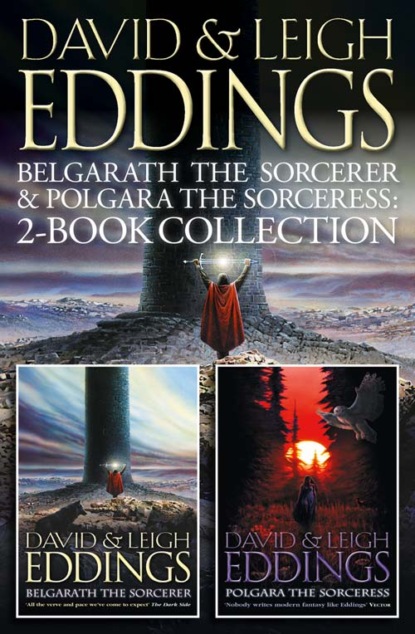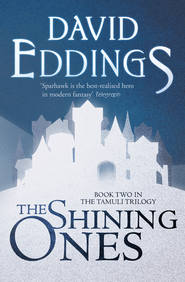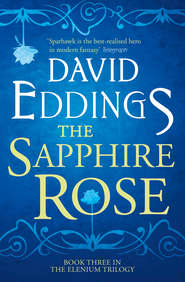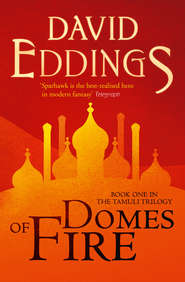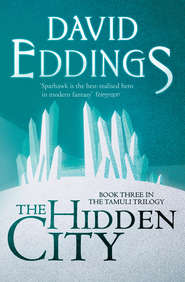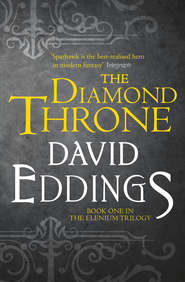По всем вопросам обращайтесь на: info@litportal.ru
(©) 2003-2025.
✖
Belgarath the Sorcerer and Polgara the Sorceress: 2-Book Collection
Автор
Год написания книги
2019
Настройки чтения
Размер шрифта
Высота строк
Поля
‘But that’ll only be my opinion.’
‘That’s sort of the way it works, yes.’
‘What if I’m wrong?’
‘That’s the chance you have to take.’ I leaned back in my chair. ‘There aren’t any absolutes, Pol. Life would be simpler if there were, but it doesn’t work that way.’
‘Now I’ve got you, old man.’ She said it with a certain disputational fervor. Polgara loves a good argument. ‘There are things we know for certain.’
‘Oh? Name one.’
‘The sun’s going to come up tomorrow morning.’
‘Why?’
‘It always has.’
‘Does that really mean that it always will?’
A faint look of consternation crossed her face. ‘It will, won’t it?’
‘Probably, but we can’t be absolutely certain. Once you’ve decided that something’s absolutely true, you’ve closed your mind on it, and a closed mind doesn’t go anywhere. Question everything, Pol. That’s what education’s all about.’
‘This might take longer than I thought.’
‘Probably so, yes. Shall we get started?’
Pol needs reasons for the things she does. Once she understood why reading was so important, she learned how in a surprisingly short time, and she got better at it as she went along. Perhaps it was something to do with her eyes. I can probably read faster than most because I can grasp the meaning of an entire line at a single glance. Pol picks up whole paragraphs in the same way. If you ever have occasion to watch my daughter reading, don’t be deceived by the way she seems to be idly leafing through a book. She isn’t. She’s reading every single word. She went through my entire library in slightly more than a year. Then she went after Beldin’s – which was a bit more challenging, since Beldin’s library at that time was probably the most extensive in the known world.
Unfortunately, Polgara argues with books – out loud. I was engaged in my own studies at the time, and it’s very hard to concentrate when a steady stream of ‘Nonsense!’ ‘Idiocy!’ and even ‘Balderdash!’ is echoing off the rafters.
‘Read to yourself!’ I shouted at her one evening.
‘But, father dear,’ she said sweetly, ‘you directed me to this book, so you must believe what it says. I’m just trying to open your mind to the possibility of an alternative opinion.’
We argued about philosophy, theology and natural science. We haggled about logic and law. We screamed at each other about ethics and comparative morality. I don’t know when I’ve ever had so much fun. She crowded me at every turn. When I tried to pull in the wisdom of ages to defend my position, she neatly punctured all my windy pomposity with needle-sharp logic. In theory, I was educating her, but I learned almost as much as she did in the process.
Every so often, the twins came by to complain. Pol and I are vocal people, and we tend to get louder and louder as an argument progresses. The twins didn’t really live all that far away, so they got to listen to our discussions – although they’d have preferred not to.
I was enormously pleased with her mind, but I was somewhat less pleased with the wide streak of vanity that was emerging in her. Polgara tends to be an extremist. She’d spent her young girlhood being militantly indifferent to her appearance. Now she went completely off the scale in the opposite direction. She absolutely had to bathe at least once a day – even in the winter time. I’ve always been of the opinion that bathing in the winter is bad for your health, but Pol scoffed at that notion and immersed herself up to the eyebrows in warm, soapy water at every opportunity. More to the point, though, she also suggested that I should bathe more frequently. I think she had some sort of mental calendar ticking away inside her head, and she could tell me – and frequently did – exactly how long it had been since my last bath. We used to have long talks about that.
So far as I was concerned, if she wanted to bathe five times a day, that was up to her. But she also insisted on washing her hair each time! Pol has a full head of hair, and our tower seemed to be filled with a perpetual miasma. Damp hair is not one of my favorite fragrances. It wasn’t so bad in the summer time when I could open the windows to air the place out, but in the winter I just had to live with it.
I think the last straw was when she moved Beldaran’s standing mirror into a position where she could watch herself reading. All right, Polgara had grown up to be at least as pretty as Beldaran, but really –
She did things to her eyebrows that looked terribly painful to me.
I know as a matter of fact that they were painful, since I woke up one morning with her leaning placidly over me plucking out mine – hair by hair. Then, still not content, she started on my ears. Neatness is nice, I guess, but I drew the line there. The hair in a man’s ears is there for a reason. It keeps out bugs, and it insulates the brain from the chill of winter. Polgara’s mother had never objected to the fact that I had furry ears. Of course, Poledra looked at the world differently.
Pol spent inordinate amounts of time with her hair.
She combed.
She brushed.
She made me crazy with all that fussing. Yes, I know that Polgara has beautiful hair, but it crackles when the weather turns cold. Try it sometime. Let your hair grow until you can sit on it; then stroke it with a brush on a chill winter morning. There were times when she looked like a hedgehog, and bright sparks flew from her fingers whenever she touched anything even remotely metallic.
She used to swear about that a lot. Polgara doesn’t really approve of swearing, but she does know all the words.
I think it was during the late spring of her eighteenth year when she finally stepped over the line and demonstrated her talent while I was watching. It’s an obscure sort of modesty with Pol. She doesn’t like to have anyone around to see what she’s doing when she unleashes it. I suspect that it may have something to do with nakedness. Nobody – and I do mean nobody – has ever seen Polgara step all dripping from her bath wearing nothing but that dreamy smile. She conceals her gift in that self-same way – except in an emergency.
It wasn’t actually an emergency. Pol had been deep into a Melcene philosophical tract, and she was concentrating on it very hard. I sort of suggested that it had been two days since we’d eaten. It was the end of winter, and I suppose I could have gone wolf and chased down a fieldmouse or two, but I really wanted something to eat. Fieldmice are nice, but they’re all fur and bones, and that’s not really very satisfying for a full-grown animal.
‘Oh, bother,’ she said, and made a negligent sort of gesture – without even looking up from her book – and there was quite suddenly a hind-quarter of beef smoking on the kitchen table – without benefit of platter.
I looked at it with a certain amount of chagrin. It was dripping gravy all over my floor, for one thing, and it wasn’t quite fully done, for another. Polgara had provided cow. Cooking and seasoning to taste was my problem.
I bit down very hard on my lower lip. ‘Thanks awfully,’ I said to her in my most acid tone.
‘Don’t mention it,’ she replied without raising her eyes from her book.
Chapter 24 (#ulink_45d3beb4-6503-5e73-9042-36516426eb43)
The world outside the Vale was changing. There’s nothing particularly remarkable about that; the world is always changing. About the only difference this time lay in the fact that we noticed it. The open grasslands to the north of us had always been uninhabited before – unless you count the wild horses and cattle. But now the Algars lived there.
I always rather liked Algar Fleet-foot. He was clearly the most intelligent of Cherek’s sons. The fact that he never missed an opportunity to keep his mouth shut was an indication of that. I suspect that if he’d been Cherek’s first son, it might not have been necessary to break up Aloria. This is not intended to throw rocks at Dras Bull-neck. Dras was unquestionably one of the bravest men I’ve ever known, but he was just a bit on the impetuous side. Maybe his sheer physical size had something to do with that.
Fleet-foot’s breeding program was beginning to produce larger horses and more and more of his people were mounted now. He’d also begun to cross-breed the rather scrubby Alorn cattle with the wild cows of the plain to produce animals of a significant size which were at least marginally tractable.
The Algars were fairly good neighbors – which is to say that they didn’t pester us. Fleet-foot periodically sent messengers to the Vale to bring us news, but otherwise his people left us alone.
It was about two years after Beldaran’s wedding – late spring I think it was – when Algar himself came down into the Vale with his cousin Anrak. ‘Good news, Belgarath,’ Anrak called up to my tower. ‘You’re going to become a grandfather.’
‘It’s about time,’ I called down. ‘Come on up, both of you.’ I went to the head of the stairs and told the door to open to admit them.
‘When’s Beldaran due?’ I asked as they started up the stairs.
‘A month or so, I suppose,’ Anrak replied. ‘She wants you and her sister to come to the Isle. Ladies like to have family around for the birth of their first child, I guess.’ They reached the top of the stairs, and Anrak looked around. ‘Where’s Lady Polgara?’ he asked.
‘She’s visiting the twins,’ I told him. ‘She’ll be back in a bit. Sit down, gentlemen. I’ll bring some ale. I think this calls for a little celebration.’
We sat and talked for most of the rest of the afternoon, and then Polgara returned. She took the news quite calmly, which rather surprised me. ‘We’ll need to pack a few things,’ was about all she said before she started supper. I strongly suspect that she already knew about her sister’s condition.
‘I brought horses,’ Algar said quietly.
‘Good,’ Pol replied. ‘It’s a long trip.’
‘Have you ridden very often?’ he asked her.





